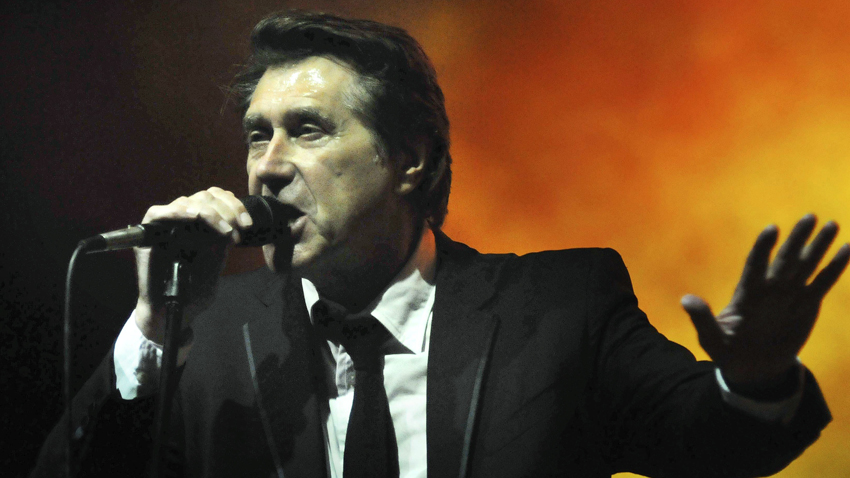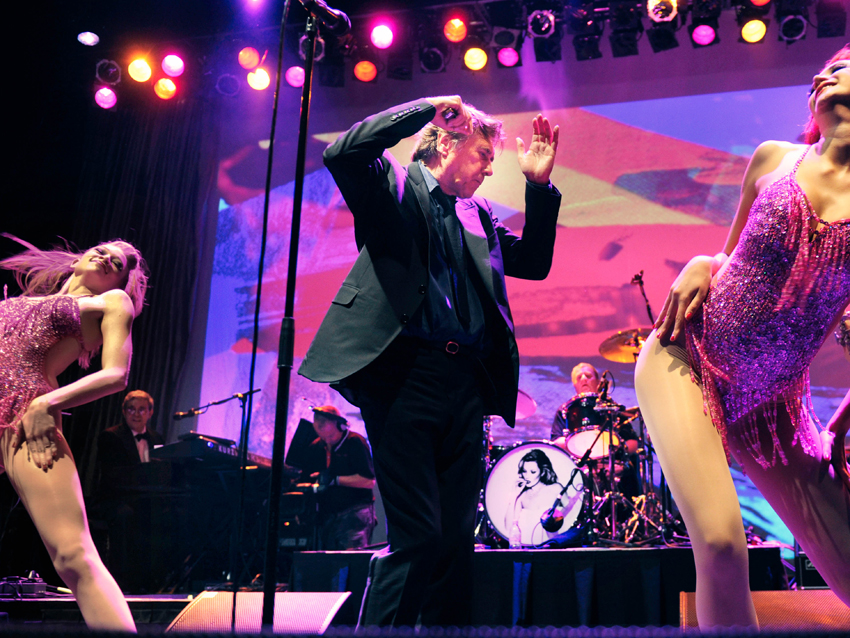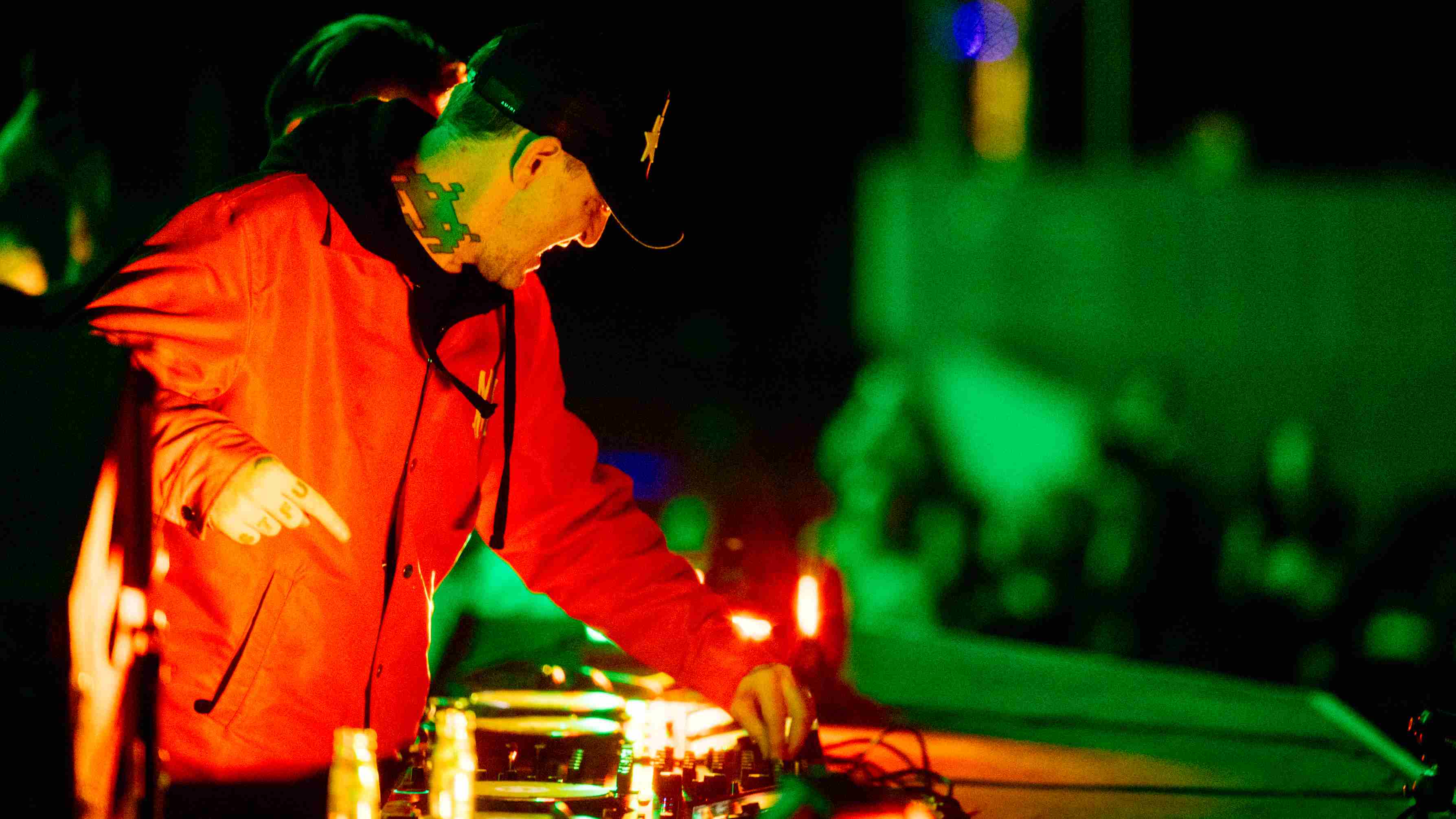
Bryan Ferry has always had a way of appearing as though he wasn't built for these times. Impeccably groomed and prone to wearing dinner jackets and tuxedos, he exuded an effortless James Bond-like sophistication while crooning the daring avant-rock/pop of Roxy Music, a wildly influential group (which at one time included Brian Eno) that produced a lasting string of hits such as Love Is The Drug, Dance Away, Flesh + Blood, along with the stone-cold classic album, Avalon.
Ferry steps away from the present in a most radical form on The Jazz Age, his recently released re-interpretation of Roxy Music and solo gems that casts the music as 1920 jazz instrumentals, recorded with such attention to detail that the sound approximates with stunning authenticity that of a 78 rpm disc spinning on a Victrola. This isn't the singer's first trip down musical memory lane - he's previously sung the songs of Bob Dylan, the Velvet Underground and The Beatles, among others, and on 1999's As Time Goes By, he set a collection of standards in the 1930s - but it just might be his most sensational work, yet.
Ferry recently sat down with MusicRadar to discuss his deep love of Gatsby-era jazz, how the Bryan Ferry Orchestra recorded the new set, what the future holds for Roxy Music and whether he ever dresses like the rest of us.
Let's say you're a hardcore Roxy Music fan but know nothing of jazz. What would you think of The Jazz Age?
"I would think that I was listening to some music from the 1920s, which had a familiar sound. Then I would exclaim, 'Hang on! Isn't that Love Is The Drug?'"
And what if you were a die-hard jazz aficionado but knew very little pop music - what would you make of the album?
"That I had discovered a rare and much-sought-after compilation album of various bands from the 1920s."
Get the MusicRadar Newsletter
Want all the hottest music and gear news, reviews, deals, features and more, direct to your inbox? Sign up here.
Based on the authentic quality of the recordings, one would imagine you have quite an extensive library of jazz recordings. Is that the case? And what must your iPod playlist look like?
"Well, I have been a fan of that music since 1955 and have always found the 1920s to be a fascinating period. However, my main inspirations from the jazz world would have to be Charlie Parker, Coleman Hawkins and Ornette Colman, who of course came a bit later. I don't use an iPod, but my record collection is quite eclectic and includes as much Maria Callas as Billie Holliday."
What went into your decision to not sing on the album and keep it instrumental? You do know that people are quite fond of your voice…
"I had wanted to make an instrumental album for some time, where the spotlight was on my songwriting rather than my vocal performance. It could have been done in various ways, but I thought it would be an interesting notion to do it in the 1920s jazz idiom. Until you do something like this, no one tends to think of you as a writer of melodies, which for me has always been an important aspect of my work.
"In my upcoming tour I will be doing some vocal versions of these period arrangements. I am also working on a new album where my voice will be featured… yet again."
You've reinterpreted your own material before, but this is a definitive re-imagining. Was it difficult to get past what is probably in your musical DNA?
"Not really. I suppose you could say my career so far has been a process of remaking and remodeling, and this was yet another experiment. It was quite moving for me to hear my tunes played in this style by such wonderful musicians. Colin Good, in particular, played an important role on the album as bandleader, pianist and arranger. His detailed wealth of knowledge of the period was invaluable."
The recordings are very period-authentic: they're in mono and sound as if they could come from a Victrola. How was the band recorded? What kinds of mics and studio gear were used to render the sonics faithfully?
"I wanted the record to sound of the period, but at the same time to have some clarity. It was all recorded at my studio in London, using an assortment of vintage RCA 77-D, Telefunken U49 and Neumann U67 microphones, and we, of course, decided that mono was the preferred way to go."
What about the band's instruments, specially the drums that John Sutton used? Did he play a modern kit and the sounds were treated, or did he play a vintage kit - as in really vintage?
"John Sutton uses a drum kit from the 1920s with a rather big kick drum - it looks very much the part. Enrico Tommasi's cornet is also of that vintage, as is Richard White's bass saxophone. Essentially everything on the record is authentic. The raw recordings were effectively what you would have heard in the 1920s, but we EQ'd them to add a period charm."

Recording his songs in 1920s jazz-style was, Ferry says, "a question of trial and error." © Dana Yavin/The Hell Gate/Corbis
The original recording of Love Is The Drug, of course, has a great dance beat. Here you turn it into something of a mournful blues dirge. You didn't hear it as flapper-type song?
"Part of the fun of arranging these songs was the unpredictability of where this style of music would take them. Colin Good and I would work out the arrangements, tempos et cetera, and generally by playing the song a particular feel would emerge.
"Sometimes the song would just be taken somewhere else by one of the players and we would go with the flow. It really depended on the song - some suited to an Ellingtonian Cotton Club style, whereas with others we opted for a more basic New Orleans kind of thing. Love Is The Drug is one of my favorites, done as a kind of funeral march. It, of course, could have been done in many different ways."
Avalon retains its gentle, hypnotic quality, but now there's a jauntiness that wasn't in the original. What was your overall plan with this version?
"Avalon was actually one of the more challenging songs to arrange. We tried it a few different ways, and then I remember Enrico suggested we do it in a Cuban Habenero style, which, in fact, really suited the song."
Were there any songs from your past that you considered or even tried in this fashion, but for whatever reason, they just wouldn't work?
"As with many things, it was a question of trial and error. If a song didn't work immediately, we would come back to it later with a different approach."
A couple of years ago, you hinted in an interview that some new Roxy Music was possible. Is it even more possible now? What is the status of Roxy Music?
"I look back on my Roxy Music years with great affection, but for the moment I'm very busy with my solo career."
You've always worked with some pretty impressive musicians, most notably guitar players. Who have been some of your favorites? What, essentially, do you look for in a guitarist?
"Yes, it is one of my guilty pleasures. In recent years, there has been my young guitarist Oliver Thompson, who played on my 2010 album, Olympia. Also Nile Rodgers, who of course is a really brilliant rhythm guitarist. I must also mention Neil Hubbard, Waddy Wachtel, Phil Manzanera, John Porter, David Gilmour, Mark Knopfler and Johnny Marr - the list goes on - all of whom have played wonderful things on my records."
Roxy Music, for some reason, isn't yet in the Rock And Roll Hall Of Fame. What's up with that?
"I'm sure it's just an oversight."
Last question, but we just have to ask: You're certainly known for your exquisite sartorial style. Do you ever just sit around in a T-shirt and jeans with a hole in them? Are you like the rest of us?
"Not now. I had my Jack Kerouac period many years ago."
Joe is a freelance journalist who has, over the past few decades, interviewed hundreds of guitarists for Guitar World, Guitar Player, MusicRadar and Classic Rock. He is also a former editor of Guitar World, contributing writer for Guitar Aficionado and VP of A&R for Island Records. He’s an enthusiastic guitarist, but he’s nowhere near the likes of the people he interviews. Surprisingly, his skills are more suited to the drums. If you need a drummer for your Beatles tribute band, look him up.
"At first the tension was unbelievable. Johnny was really cold, Dee Dee was OK but Joey was a sweetheart": The story of the Ramones' recording of Baby I Love You
"Reggae is more freeform than the blues. But more important, reggae is for everyone": Bob Marley and the Wailers' Catch a Fire, track-by-track










